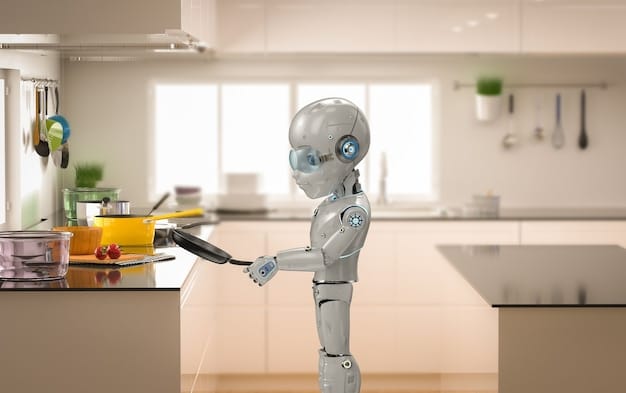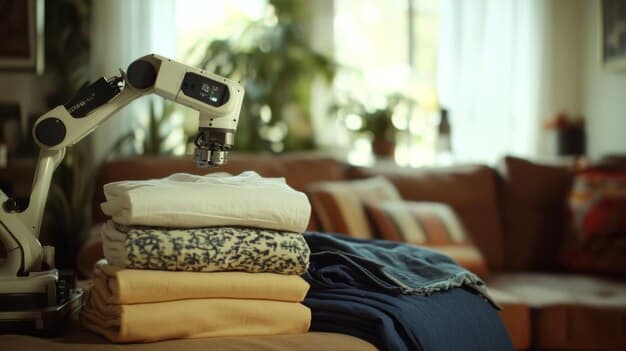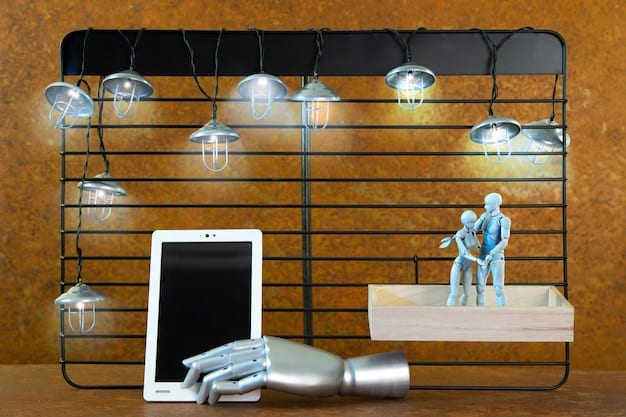The Future of Home: How Automation and Robots Will Change Chores

The Impact of Automation: How Robots Will Transform Home Chores in the Next Decade is poised to revolutionize household tasks, promising increased efficiency and convenience by leveraging advancements in robotics and artificial intelligence.
Imagine a home where tedious chores are a thing of the past. The Impact of Automation: How Robots Will Transform Home Chores in the Next Decade isn’t a futuristic fantasy; it’s a rapidly approaching reality, promising to reshape our lives and free up valuable time for what truly matters.
The Rise of the Robot Home Assistant
Robots have long been a staple of science fiction, but they’re increasingly becoming a practical solution for everyday tasks. The integration of robots into our homes promises to change how we manage household chores, offering a glimpse into a future where domestic work is largely automated.
From vacuuming to laundry, robots are poised to take over many of the repetitive and time-consuming tasks that currently occupy our days. This shift will not only free up our time but also potentially improve the quality of our lives by reducing stress and increasing leisure time.
Current Robotic Solutions for Home Chores
Several robotic solutions are already available on the market, offering a glimpse into the automated future of home chores. Here’s a look at some of the most popular and effective options:
- Robotic Vacuum Cleaners: These devices automatically navigate your home, vacuuming floors and carpets with minimal human intervention.
- Robotic Mops: Similar to robotic vacuums, these devices mop hard floors, ensuring your home stays clean and tidy.
- Smart Lawn Mowers: These robots autonomously mow your lawn, keeping it perfectly trimmed without you having to lift a finger.
These early examples demonstrate the potential of automation to transform home chores, paving the way for even more advanced and sophisticated robotic solutions in the future.
In conclusion, the rise of the robot home assistant signifies a major shift in our approach to domestic work, offering the promise of increased convenience, efficiency, and ultimately, a better quality of life.

Automation in the Kitchen: A Culinary Revolution
The kitchen, often considered the heart of the home, is ripe for automation. Imagine robots that can prepare meals, clean dishes, and even manage your grocery list. This isn’t just a dream; it’s a future rapidly approaching, thanks to advancements in robotics and artificial intelligence.
Automated kitchen appliances are already making inroads into our homes. From smart refrigerators that track inventory to automated coffee makers that brew the perfect cup, technology is gradually taking over many of the tasks that once required manual effort.
The Potential of Robotic Chefs
One of the most exciting prospects in kitchen automation is the development of robotic chefs. These advanced robots could potentially prepare entire meals from scratch, following recipes and adjusting ingredients based on your preferences.
- Automated Meal Preparation: Robots can chop vegetables, mix ingredients, and even cook food using various methods, such as baking, frying, and grilling.
- Customized Nutrition: Robotic chefs can track your dietary needs and create meals that meet your specific nutritional requirements.
- Reduced Food Waste: By precisely measuring ingredients and managing food inventory, robots can help reduce food waste and save you money.
The integration of robotic chefs into our kitchens could revolutionize the way we eat, making healthy and delicious meals more accessible and convenient than ever before.
In conclusion, automation in the kitchen represents a culinary revolution, promising to transform the way we prepare and consume food, making our lives easier, healthier, and more enjoyable.
Cleaning and Maintenance: The End of Tedious Tasks
Cleaning and maintenance are often the most dreaded household chores. However, automation is poised to alleviate this burden, with robots capable of handling a wide range of cleaning tasks, from scrubbing floors to cleaning windows.
Robotic cleaning solutions are already becoming increasingly popular, with devices like robotic vacuum cleaners and mops making it easier than ever to keep our homes tidy. But the future holds even more advanced and sophisticated cleaning robots, capable of tackling even the most challenging tasks.
Advanced Robotic Cleaning Systems
The next generation of cleaning robots will go beyond simple vacuuming and mopping, offering a comprehensive solution for home maintenance. These robots will be equipped with advanced sensors, artificial intelligence, and specialized tools, allowing them to handle a wide range of cleaning tasks.
- Window Cleaning Robots: These devices can automatically clean windows, both inside and out, eliminating the need for manual scrubbing.
- Gutter Cleaning Robots: These robots can safely and efficiently clean gutters, preventing water damage and maintaining the integrity of your home.
- Pool Cleaning Robots: These devices can automatically clean pools, removing debris and ensuring the water stays clean and clear.
The development of advanced robotic cleaning systems promises to make home maintenance easier and more convenient than ever before, freeing up our time and energy for more enjoyable activities.
In conclusion, automation in cleaning and maintenance signals the end of tedious tasks, promising to transform our homes into havens of cleanliness and comfort, where we can relax and enjoy our time without worrying about household chores.
The Impact on Time and Lifestyle
One of the most significant benefits of automation in home chores is the potential to free up our time and improve our lifestyle. By taking over many of the repetitive and time-consuming tasks that currently occupy our days, robots can give us back valuable time to pursue our passions, spend time with loved ones, and simply relax.
For many people, household chores are a major source of stress and frustration. Automating these tasks can help reduce stress levels and improve overall well-being, allowing us to focus on the things that truly matter.
The Benefits of Free Time
The extra time gained through automation can be used in a variety of ways, depending on your individual priorities and interests. Here are just a few examples:
- Pursue Hobbies: With more free time, you can dedicate yourself to pursuing hobbies and interests that you may have previously neglected due to lack of time.
- Spend Time with Loved Ones: Automation can free up valuable time to spend with family and friends, strengthening relationships and creating lasting memories.
- Relax and Recharge: By taking over household chores, robots can give you the opportunity to relax, recharge, and improve your overall well-being.
The impact of automation on our time and lifestyle is profound, offering the potential to transform our lives in countless positive ways.
In conclusion, the automation of home chores offers a pathway to reclaiming our time and enriching our lifestyles, allowing us to prioritize personal growth, relationships, and overall well-being.

Overcoming Challenges and Concerns
While the prospect of automated home chores is exciting, it’s important to acknowledge the challenges and concerns that may arise. Cost, privacy, and job displacement are just a few of the issues that need to be addressed as we move towards a more automated future.
Automation has the potential to create new economic opportunities, but it also raises concerns about job displacement, particularly for those who work in the cleaning and maintenance industries. It’s important to address these concerns proactively, providing job training and support to help workers transition to new roles.
Addressing Key Concerns
Here are some of the key challenges and concerns associated with automation in home chores, along with potential solutions:
- Cost: The initial cost of robotic devices can be a barrier for some homeowners. As technology advances and production costs decrease, prices are likely to become more affordable.
- Privacy: Some people may be concerned about the privacy implications of having robots in their homes, particularly if these devices are equipped with cameras and microphones. It’s important for manufacturers to prioritize privacy and security, offering users control over data collection and usage.
- Job Displacement: Automation may lead to job displacement in certain industries. It’s important to provide job training and support to help workers transition to new roles and adapt to the changing job market.
By addressing these challenges and concerns proactively, we can ensure that the benefits of automation are shared by all members of society.
In conclusion, overcoming the challenges and concerns surrounding automation requires a thoughtful and proactive approach, ensuring that the benefits of this technology are accessible to all while mitigating potential negative impacts.
The Future of Home Chores: A Glimpse into 2035
Looking ahead to 2035, it’s clear that automation will play an even greater role in our homes. Robots will become more sophisticated, intelligent, and integrated into our daily lives, transforming the way we manage household chores.
We can expect to see robots that are capable of handling a wider range of tasks, from cleaning and maintenance to meal preparation and personal assistance. These robots will be equipped with advanced sensors, artificial intelligence, and machine learning algorithms, allowing them to adapt to our individual needs and preferences.
Emerging Technologies and Trends
Here are some of the emerging technologies and trends that are likely to shape the future of home automation:
- Artificial Intelligence: AI will play a central role in the development of advanced robotic systems, allowing robots to learn, adapt, and make decisions autonomously.
- Internet of Things (IoT): The IoT will connect all of our household devices, allowing them to communicate and coordinate with each other, creating a seamless and integrated smart home experience.
- Advanced Sensors: Advanced sensors will enable robots to perceive their environment with greater accuracy and precision, allowing them to navigate complex spaces and perform delicate tasks.
The future of home chores is bright, with technology promising to transform our homes into havens of convenience, efficiency, and comfort.
In conclusion, the future of home chores in 2035 paints a vivid picture of seamless integration of advanced technologies, creating a home environment that anticipates our needs and enhances our daily lives through automation.
| Key Point | Brief Description |
|---|---|
| 🧹 Robotic Cleaning | Robots handle vacuuming, mopping, and window cleaning. |
| 🧑🍳 Automated Cooking | Robotic chefs prepare meals and manage nutrition. |
| ⏰ Time Savings | More free time for hobbies and relaxation. |
| 💡 Smart Home Integration | AI and IoT enhance home automation systems. |
Frequently Asked Questions
The cost varies widely. Basic robotic vacuums start around $200, while advanced models with more features can cost upwards of $1000. More sophisticated robots, like robotic chefs, are still in development and are expected to be more expensive initially.
Most home robots are designed with safety features to minimize risks. However, it’s essential to supervise young children and pets when robots are in operation. Always follow the manufacturer’s instructions and guidelines for safe usage.
Currently, robots excel at routine tasks like vacuuming, mopping, and window cleaning. However, they may struggle with more complex or delicate tasks. As technology advances, we can expect robots to handle a wider range of cleaning duties.
Regular maintenance is crucial for ensuring the longevity of your robots. This typically involves cleaning sensors, replacing brushes, and emptying dustbins. For more complex repairs, it’s best to consult the manufacturer or a qualified technician.
Ethical considerations include data privacy, job displacement, and the potential for over-reliance on technology. It’s important to address these concerns through responsible development, regulation, and education to ensure that robots benefit society as a whole.
Conclusion
The impending transformation of home chores through automation and robotics offers a promising future, marked by increased efficiency, convenience, and enhanced lifestyles. As technology continues to advance, addressing key challenges and embracing ethical considerations will be essential to ensure a seamless transition into this automated future.





